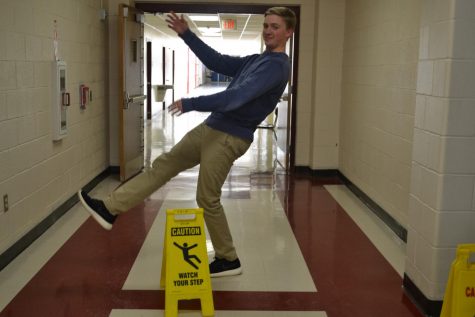
Fun Fact: He enjoys fishing and playing lacrosse. He also has a black jeep wrangler.

June 9, 2017
Nearly two years after West Essex implemented its 1:1 Chromebook initiative, a number of students report aging devices. A combination of natural wear-and-tear and appreciable student abuse has left many Chromebooks physically mangled and sinking into a technological slump.
While student reception to the introduction of Chromebooks has been largely positive, the devices’ lengthy repair process has evoked less friendly reviews.
Although there are not yet official plans in place to accommodate maturing Chromebooks, the school is continuously looking for ways to improve the repair and distribution processes.
Beginning with the 2015-16 school year, all West Essex students received a Chromebook. In the statement of vision listed on West Essex’s 1:1 initiative webpage, the school cites meaningful student engagement and equality of access as their goals.
“We believe the opportunity for each student to have their own device will result in an overall enhanced educational experience, better student organizational skills and expansion of learning and sharing beyond the walls of the traditional classroom,” the school states.
Since that introduction more than 20 months ago, however, several students have reported technical problems with their Chromebooks, as well as dissatisfaction with the amount of time it takes the school and its outside vendors to service devices that are experiencing problems.
The repair process, Director of Technology Mr. Burrows explained, is often a joint effort between three parties: the school’s technology department, an insurer and a repair facility.
“If the issue does not require additional parts, we will fix it in house,” Mr. Burrows said. “If the issue is due to a manufacturer’s defect or accidental damage, we submit a claim to our Chromebook insurance company.”
After the school submits a damage claim to their insurance company, the insurer must then accept or reject the claim before sending the defect to a repair facility.
Upon completion of repairs, computers return to the school where West Essex’s technology department performs their own quality check to ensure the problem has been adequately resolved.
The lineage of substantive repairs, however, means that in the interim, many students are left with replacement devices that sometimes are themselves not fully functioning—or, in some cases, left without a device at all—for extensive amounts of time.
While Mr. Burrows estimated the typical turnaround on out-of-house repairs to be about two weeks, he noted that “this also depends on [the insurer’s] workload and if they have necessary parts on hand.”
In most cases, Mr. Burrows said, Chromebooks are returned within the two week window.
Several students the Wire spoke to said that navigating the repair process was often a challenge, pointing to long waits and faulty loaner devices.
Junior Natalie Guerra said that the second time she turned her Chromebook into the library for repair, “it took about a month to even get a loaner,” adding that “I was able to take one of the big Dell laptops to borrow, but they had to go back at the end of the school day and were very heavy.”
There are currently 40 loaner devices available at the high school—a number Mr. Burrows says the school hopes to increase “in the near future.”
While some students have sought alternatives to the inconvenience of the current repair process by bringing in home computers, school policy mandates that all repairs must be performed through the district.
“Students are not allowed to make repairs themselves or have the device serviced by an outside company,” Mr. Burrows said.
With some students worried about reduced battery life and physical breakdown of their Chromebooks, the Wire inquired about plans to update or replace Chromebooks in the future.
Mr. Burrows said proposals are in the works, but have not been formally confirmed.
“At this time only ideas have been thrown around,” Mr. Burrows said. “I would like to try and get us on a three year refresh cycle where certain grade levels will get new machines every year.”
Principal Mr. Diliberto is involved in developing plans to manage Chromebooks as the current ones begin to wear down.
“We wouldn’t replace all the Chromebooks at once,” Mr. Diliberto said. “We would cycle in new ones beginning with the seventh grade and any replacements.”
In its End of Life Policy, Google lists the Auto Update Expiration date for the Acer C740 Chromebook—the device the school provides to its students—as February 2020.
In the policy, Google states that “when a device reaches Auto Update Expiration (AUE), it means that the product model is considered obsolete.”
Education customers using devices that have passed their AUE date will no longer receive full support from the Google Cloud and Google for Education teams.
Mr. Burrows noted that while the “typical lifespan of these devices can be anywhere from three to six years,” usage and condition often play a role in expiration. Device performance and battery life—which Acer claims as nine hours—rely heavily on upkeep and degree of usage.
Mr. Diliberto attested to that message.
“Administration and the IT Department are always looking for the most efficient ways to repair and distribute Chromebooks,” he said. “At this point, the most efficient method for repairs and replacement is prevention by taking better care of the devices.”

